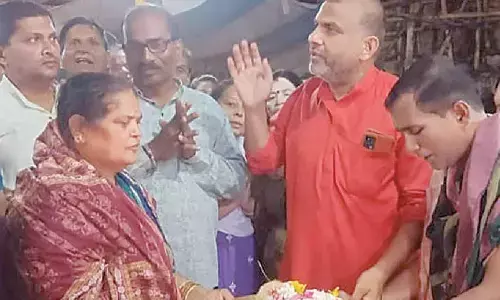Little hands, gruelling work

Telangana has reported over 350 farmer suicide deaths this kharif season. The impact of the drought and agriculture distress that is taking lives is also being felt on future generations.
Farmers’ suicides turn school-going children farm labourers
Medak: Telangana has reported over 350 farmer suicide deaths this kharif season. The impact of the drought and agriculture distress that is taking lives is also being felt on future generations. School-going children, as young as 8, are found to be working in the fields, picking cotton.

Seventh class student Deepika and her sister Dhanalakshmi are working on the field, picking cotton. A month ago, their father drank pesticide and died, after a failed crop and accumulated debts. "My father died. We don't have money. To earn 100, I came to pick cotton. My mother has been crying at home. She's unwell. Someone has to work," says Deepika.
Dhanalakshmi explains that the choice is between going hungry and giving up school. "When our father was there, we didn't have to work. Now there is no money." In village after village that we travelled, we have seen children working as farm labour, not because they are driven by oppressive landlords but because there is poverty and farm distress.
When asked why she is not in school, Navya - a fifth class student - gives a look as though it is a rhetorical question.
"Because there is no money, so my parents asked me to go to work, so I came," she says. Locals tell us children are preferred as labour and are paid wages matching adults because they pick cotton faster. That is some 100-120 for a day.
Child rights activist Shanta Sinha says families don't need children to work, it is the employers who do, because they get cheap labour that can be easily controlled. "Children are cheap labour. You remove them from the workforce, the wages will go up some five times."
School teacher Puliraju says it is heartbreaking that almost every child in his government school "100 per cent" definitely goes for seasonal farm work like picking cotton, plucking beans, maize cobs.
Isidore Philips, director of NGO Divya Disha, says the government doesn't seem to realise the long-term impact not just on the children's health but also on the economy and society. "Unless you help the socioeconomic situation of the family and see the child in that context, you have to address multiple issues at the same time. But child in school and not as labour is non-negotiable." The government admits that agriculture distress is pushing even children enrolled in schools to work as labour, especially at peak season. "We have ordered a survey and are getting reports from the collectors on the impact drought is having on farmers and their families," agriculture minister Pocharam Srinivas said.




